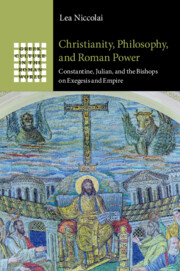 Christianity, Philosophy, and Roman Power
Christianity, Philosophy, and Roman Power Book contents
- Christianity, Philosophy, and Roman Power
- Greek Culture in the Roman World
- Christianity, Philosophy, and Roman Power
- Copyright page
- Dedication
- Epigraph
- Contents
- Figures
- Preface
- Acknowledgements
- Abbreviations, Editions, and Translations
- Introduction
- Part I At Constantius’ Court: Julian Caesar
- Chapter 1 How Philosophers Should Take Compliments When They Happen to Become Kings
- Chapter 2 Climbing the Ladder
- Part II Making and Breaking Constantine: Julian Augustus
- Part III After Julian: Philosophy in the World
- Conclusions
- Bibliography
- Subject index
- Index Locorum
Chapter 2 - Climbing the Ladder
from Part I - At Constantius’ Court: Julian Caesar
Published online by Cambridge University Press: 07 July 2023
- Christianity, Philosophy, and Roman Power
- Greek Culture in the Roman World
- Christianity, Philosophy, and Roman Power
- Copyright page
- Dedication
- Epigraph
- Contents
- Figures
- Preface
- Acknowledgements
- Abbreviations, Editions, and Translations
- Introduction
- Part I At Constantius’ Court: Julian Caesar
- Chapter 1 How Philosophers Should Take Compliments When They Happen to Become Kings
- Chapter 2 Climbing the Ladder
- Part II Making and Breaking Constantine: Julian Augustus
- Part III After Julian: Philosophy in the World
- Conclusions
- Bibliography
- Subject index
- Index Locorum
Summary
Chapter 2 expands on the alertness of Christian intellectuals to the question of cultural prestige by reading the orations composed by Julian as Caesar (355–60) in the context of the rhetorical and cultural discourse at the imperial court. Drawing on the current re-assessment of Constantius II as pursuing a reputation as a patron of culture and philosophy, the first section argues that Julian’s early panegyrics reinforce this self-image by celebrating the intellectual synergy between the Augustus and his (famously highly cultivated) new Caesar. I further show that Constantius’ imperial propaganda relied on the assumption that allegiance to Christianity was a key factor in establishing his intellectual authority. The second section considers the writings Julian composed during his Gallic campaign (Second Panegyric to Constantius; Consolation to Himself), when his relationship with Constantius was deteriorating. As Julian increasingly exploits philosophical rhetoric to challenge rather than celebrate the Augustus, the identification of Christianity with intellectual authority becomes a polemical target in his writings, marking Julian’s first expressed disagreements with the idea of Christianity as highest philosophy.
Keywords
- Type
- Chapter
- Information
- Christianity, Philosophy, and Roman PowerConstantine, Julian, and the Bishops on Exegesis and Empire, pp. 73 - 108Publisher: Cambridge University PressPrint publication year: 2023
